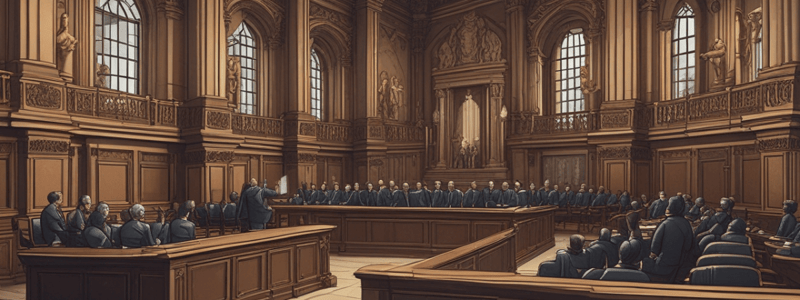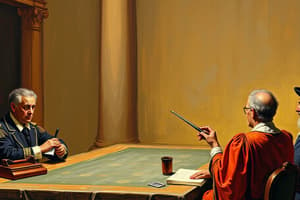Podcast
Questions and Answers
O que envolve o controle preventivo na lei brasileira?
O que envolve o controle preventivo na lei brasileira?
- Revisão de casos específicos desafiando a constitucionalidade.
- Possibilidade de todos os tribunais do Brasil revisarem leis em casos concretos.
- Capacidade do Supremo Tribunal Federal de tomar ações diretas e emitir injunções. (correct)
- Poder de revogar estatutos e atos executivos.
Qual é o poder do Supremo Tribunal Federal no controle repressivo?
Qual é o poder do Supremo Tribunal Federal no controle repressivo?
- Emitir injunções em casos que permitem superar a inércia dos legisladores.
- Introduzir decisões vinculantes com poder erga omnes.
- Revisar casos específicos desafiando a constitucionalidade.
- Anular estatutos e atos executivos. (correct)
O que é revisado na revisão concreta no direito brasileiro?
O que é revisado na revisão concreta no direito brasileiro?
- Emissão de injunções em casos que permitem superar a inércia dos legisladores.
- Capacidade de todos os tribunais do Brasil revisarem leis em casos concretos.
- Casos específicos desafiando a constitucionalidade. (correct)
- Anulação de estatutos e atos executivos.
Qual é o papel do Supremo Tribunal Federal no controle preventivo?
Qual é o papel do Supremo Tribunal Federal no controle preventivo?
Quem são os agentes capazes de exercer jurisdição constitucional centralizada conforme descrito na Constituição de 1988?
Quem são os agentes capazes de exercer jurisdição constitucional centralizada conforme descrito na Constituição de 1988?
O que o controle repressivo permite que o Supremo Tribunal Federal faça?
O que o controle repressivo permite que o Supremo Tribunal Federal faça?
Quando o Supremo Tribunal Federal realiza revisão concreta?
Quando o Supremo Tribunal Federal realiza revisão concreta?
'Controle preventivo' está mais relacionado a qual função do STF?
'Controle preventivo' está mais relacionado a qual função do STF?
'Revisão concreta' realizada pelo STF pode ter que efeito?
'Revisão concreta' realizada pelo STF pode ter que efeito?
Quem é responsável pelo controle abstrato constitucional no Brasil?
Quem é responsável pelo controle abstrato constitucional no Brasil?
Qual é a importância do controle abstrato brasileiro no sistema constitucional?
Qual é a importância do controle abstrato brasileiro no sistema constitucional?
Em que modelo de revisão judicial o Brasil se baseia?
Em que modelo de revisão judicial o Brasil se baseia?
Como o controle judicial brasileiro evoluiu ao longo das décadas?
Como o controle judicial brasileiro evoluiu ao longo das décadas?
Qual é a função do Supremo Tribunal Federal no sistema judiciário brasileiro?
Qual é a função do Supremo Tribunal Federal no sistema judiciário brasileiro?
Quando foi estabelecido o controle centralizado no Brasil?
Quando foi estabelecido o controle centralizado no Brasil?
Qual é a principal diferença entre o controle preventivo e o controle repressivo?
Qual é a principal diferença entre o controle preventivo e o controle repressivo?
Qual é a função do Controle Concentrado?
Qual é a função do Controle Concentrado?
Quem é responsável por garantir que as leis e ações governamentais sejam constitucionais no Brasil?
Quem é responsável por garantir que as leis e ações governamentais sejam constitucionais no Brasil?
O que significa o termo 'Controle Repressivo'?
O que significa o termo 'Controle Repressivo'?
Quais são as principais medidas de controle repressivo previstas no sistema jurídico brasileiro?
Quais são as principais medidas de controle repressivo previstas no sistema jurídico brasileiro?
O que é examinado no sistema de controle abstrato no Brasil?
O que é examinado no sistema de controle abstrato no Brasil?
Qual é o principal objetivo da revisão judicial no Brasil?
Qual é o principal objetivo da revisão judicial no Brasil?
O que envolve o controle preventivo no sistema legal brasileiro?
O que envolve o controle preventivo no sistema legal brasileiro?
Quando o Supremo Tribunal Federal realiza uma revisão concreta no Brasil?
Quando o Supremo Tribunal Federal realiza uma revisão concreta no Brasil?
Qual é a função principal do controle repressivo no sistema jurídico brasileiro?
Qual é a função principal do controle repressivo no sistema jurídico brasileiro?
Qual é o propósito da revisão judicial no contexto legal brasileiro?
Qual é o propósito da revisão judicial no contexto legal brasileiro?
O que caracteriza o controle abstrato na legislação brasileira?
O que caracteriza o controle abstrato na legislação brasileira?
Qual é a principal diferença entre controle preventivo e judicial review no sistema legal brasileiro?
Qual é a principal diferença entre controle preventivo e judicial review no sistema legal brasileiro?
Em que consiste o Controle Concentrado na jurisdição brasileira?
Em que consiste o Controle Concentrado na jurisdição brasileira?
Como a revisão concreta difere do controle preventivo na justiça brasileira?
Como a revisão concreta difere do controle preventivo na justiça brasileira?
Qual é a função do Supremo Tribunal Federal no Controle Preventivo?
Qual é a função do Supremo Tribunal Federal no Controle Preventivo?
'Revisão concreta' no sistema legal brasileiro envolve principalmente:
'Revisão concreta' no sistema legal brasileiro envolve principalmente:
'Controle abstrato' no Brasil tem como principal função:
'Controle abstrato' no Brasil tem como principal função:
'Controle Repressivo' é mais relacionado a qual aspecto do sistema legal brasileiro?
'Controle Repressivo' é mais relacionado a qual aspecto do sistema legal brasileiro?
'Controle Abstrato' na legislação brasileira é mais diretamente associado a:
'Controle Abstrato' na legislação brasileira é mais diretamente associado a:
Flashcards are hidden until you start studying
Study Notes
Brazilian Law: Abstract Review, Judicial Review, Preventive Control, Repressive Control, and Concrete Review
Brazilian law, particularly the Brazilian Federal Constitution of 1988, has undergone significant changes in its system of judicial review. The Brazilian system combines abstract and concrete models of judicial review, with the Federal Supreme Court (STF) serving as a constitutional court. This article explores the subtopics of abstract review, judicial review, preventive control, repressive control, and concrete review in the context of Brazilian law.
Abstract Review
Abstract constitutional control in Brazil is the responsibility of the Federal Supreme Court. The STF is tasked with ensuring the constitutionality of laws and government actions. This abstract review is an important aspect of the Brazilian constitutional system, as it serves to protect the fundamental rights and freedoms enshrined in the Brazilian Constitution.
Judicial Review
Judicial review in Brazil has its roots in the American judicial review model, but with some unique characteristics. The current Brazilian system of judicial review began as an incidental control, established in the First Republican Constitution of 1891. However, in the following decades, mechanisms for a greater centralization of control were created, leading to a proper centralized control in 1965 through a constitutional amendment. The 1988 Constitution further enlarged the number of those capable of exerting the centralized constitutional jurisdiction, including state agents, political parties, unions, and the OAB (The Brazilian Bar Association). This change transformed the position of the Brazilian Supreme Court within the political system, making it an active part in key political debates and an arena for various political and social conflicts.
Preventive Control
Preventive control in Brazilian law involves the Federal Supreme Court's ability to take direct action and issue injunctions in cases that allow the Court to overcome inertia and omission on the part of lawmakers. This power is more linked to the role of the STF as a constitutional court, as its aim is to uphold the constitutional order and fundamental rights. The Court also has the power to decree a binding precedent, introduced by the Reform of the Judiciary (Constitutional Amendment 45/2004).
Repressive Control
Repressive control refers to the court's power to strike down statutes and executive acts, which is a unique feature of the Brazilian judicial system. While all courts in Brazil have the judicial review power in concrete cases, only the Federal Supreme Court has the direct power of striking down statutes and executive acts.
Concrete Review
Concrete review in Brazilian law involves the review of specific cases where the constitutionality of a law or action is challenged. This review is conducted by the Federal Supreme Court, which has the power to issue binding decisions with erga omnes effectiveness, affecting all parties involved in the case and potentially setting a precedent for future cases.
In conclusion, the Brazilian legal system has a complex and nuanced approach to judicial review, combining abstract and concrete models, preventive and repressive control, and a strong emphasis on upholding fundamental rights and protecting the constitutional order. The Federal Supreme Court plays a central role in this system, ensuring that the Brazilian Constitution is upheld and that the rights of citizens are protected.
Studying That Suits You
Use AI to generate personalized quizzes and flashcards to suit your learning preferences.




